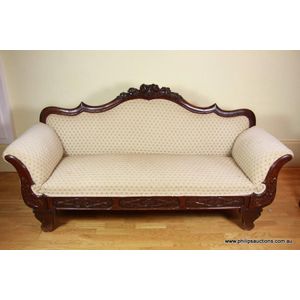Victorian Walnut Button Back Chaise Longue
You must be a subscriber, and be logged in to view price and dealer details.
Subscribe Now to view actual auction price for this item
When you subscribe, you have the option of setting the currency in which to display prices to $Au, $US, $NZ or Stg.
- Rail - A term used by cabinet makers for the horizontal sections of the frame of an item such as a chair or settee which have a front rail, a back rail and two side rails, and also on a door or carcase, where the rails are joined to the vertical framings.
- Jacquard Fabric - Jacquard fabric is woven on a jacquard loom, which allows intricate and complex patterns to be created. The jacquard loom is controlled by a system of punched cards or a computer program that controls the movement of the loom and allows for the creation of complex patterns in the fabric.
Jacquard fabric is known for its elaborate and detailed designs, which can include intricate floral patterns, geometric designs, and other complex motifs. The patterns are woven into the fabric, rather than printed or embroidered, which gives them a unique texture and depth.
Jacquard fabrics can be made from a variety of fibress, including silk, cotton, wool, and synthetic materials. They are often used for upholstery, drapery, and other decorative applications, as well as for clothing such as dresses, suits, and jackets. - Victorian Period - The Victorian period of furniture and decorative arts design covers the reign of Queen Victoria from 1837 to 1901. There was not one dominant style of furniture in the Victorian period. Designers used and modified many historical styles such as Gothic, Tudor, Elizabethan, English Rococo, Neoclassical and others, although use of some styles, such as English Rococo and Gothic tended to dominate the furniture manufacture of the period.
The Victorian period was preceded by the Regency and William IV periods, and followed by the Edwardian period, named for Edward VII (1841 ? 1910) who was King of the United Kingdom and the British Dominions and Emperor of India for the brief period from 1901 until his death in 1910. - Serpentine - Resembling a serpent, in the form of an elongated 'S'. A serpentine front is similar to a bow front, except that the curve is shallow at each end, swelling towards the middle. The term presumably derives from its similarity to a moving snake or serpent. Serpentine fronts are usually veneered, with the carcase either being cut and shaped from a solid piece of timber, or built in the 'brick' method.
This item has been included into following indexes:
Visually similar items

A Classical figured mahogany 2nd Empire settee, with a raised back rail, scrolled ends, foliate capped and claw feet.

Victorian chaise lounge, walnut with walnut Foliage carvings

A Louis XV style fruitwood framed canape, with a hardwood frame and a shaped crest rail, above scroll arms and three loose fitted seat cushions, cabriole supports, 202 cm length of back

A Victorian mahogany framed chaise longue, circa 1860s, with a scrolled showframe and a floral crest, rounded and padded arms with a relief carved seating rail and raised on square form cabriole legs; upholstered in cream floral fabric with a rose and latt
